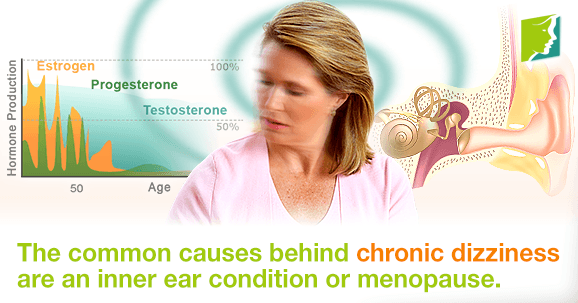Dizziness may appear to be completely spontaneous and impossible to control, which makes it even harder to deal with. However, it doesn't have to be a war against the unknown: these six facts will help you be better prepared for it, and even point you in the right direction to find relief.
It's caused by the Ears
One of the most common causes of chronic dizziness is an inner-ear condition.Then inner ear plays an important role in maintaining internal balance. Disorders such as tinnitus, which causes the sufferer to often hear a high-pitched ringing sound, or vertigo can have a major effect on the frequency and intensity of symptoms. Menière's disease, thought to involve a fluid imbalance in this region, can also contribute. This is the first place that most doctors check when dizzy episodes become a problem.
Menopause Is a Common Trigger
Though issues with the inner ear may be a common cause, women going through menopause often experience chronic dizziness as a result of hormonal imbalance. Dipping estrogen levels can negatively affect the regulation of the nervous system, especially the areas responsible for space perception and equilibrium. This can be caused not only by lack of estrogen, but by the peripheral side effects of menopause, such as: hot flashes, migraines, and panic attacks.
It's a Warning Sign
Chronic dizziness can be a warning sign for other, more serious underlying conditions. It is often cited as a precursor to heart disease. Abrupt episodes can also signal low blood pressure and low blood sugar, which may in turn cause diabetes. For these reasons, it's critical to talk to a doctor about the problem early so that other disorders can be detected.
It's Still Sometimes a Mystery
There are some cases where the causes of dizziness are unknown. Treatment may require trial and error at first, but a lack of an established cause does not mean a lack of cure. Research on the inner workings of chronic dizziness remain ongoing. Click here to learn more about treatment options.
Sources
- Better Health Channel. (2014). Dizziness and Vertigo. Retrieved November 6, 2013, from http://www.betterhealth.vic.gov.au/bhcv2/bhcarticles.nsf/pages/Dizziness_and_vertigo
- National Institutes of Health. (n.d). What Are the Signs and Symptoms of Heart Disease? Retrieved November 6, 2013, from http://www.nhlbi.nih.gov/health/health-topics/topics/hdw/signs.html
- Owada, S. , Yamamoto, M. , Suzuki, M. , Yoshida, T. & Nomura, T. (2012). Clinical evaluation of vertigo in menopausal women. Nihon Jibiinkoka Gakkai Kaiho, 115(5), 534-539. Retrieved from http://www.ncbi.nlm.nih.gov/pubmed/22686064




